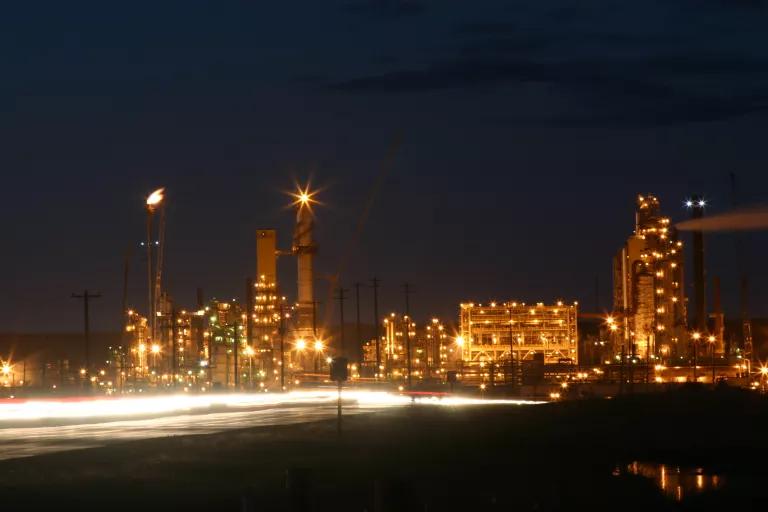

No, not one of Vincent van Gogh's or Don McLean's version – there's a certain "s"omething missing here – the palette is black. Alberta’s Premier, Ed Stelmach, arrives in Washington this week to "enhance already strong economic ties between Alberta and the United States and to build on the success of the Alberta’s energy industry to create long term, multi-sector economic growth in the province through increased bilateral trade", together with the Alberta Enterprise Group, a "common sense public policy advocacy group" that is "focused on improving life for all Albertans". It appears that in pursuing their noble aim they forgot to consult with... most Albertans, who have repeatedly called for a slowdown of activities and stricter environmental standards for tar sands development, and who lament the high cost of living that those who do not jump on that bandwagon are faced with in the Province.
The trade mission is aimed at pitching the destruction of Alberta's Boreal North as an important element in the U.S.' energy security, and the Province as the friendly, non-fundamentalist neighbor to the north who will fill our gas tank with fuel derived through an extraction process that ironically amounts to holy war against Canada's unique natural heritage. For those of you unfamiliar with what the tar sands are and how oil makes its way to the pump from Northern Alberta, I recommend Andrew Nikiforuk's excellent article. If at the end of it you wonder whether the descriptions are somewhat far fetched, you are not the first. I reacted in the same way. Then I went to Alberta myself to witness the scene, and realized that there was not an element of exaggeration in his narrative – you can see an illustrated account of my trip here.
It is not the first time that Albertan leadership has come to Washington to strengthen ties and demonstrate, in Stelmach’s own words, how Alberta is an "excellent investment opportunity; a good place to do business". But this time the scene looks very different. On one hand, world oil prices are soaring near $100/barrel, making a once marginal practice a potentially lucrative venture. On the other hand though, the noose is tightening on those looking to make a buck out of environmental and social upheaval, and probably faster than they think. The reasons? Public awareness and legislation.
Last week, NRDC announced the launch of a new campaign urging 15 major U.S. and Canadian airlines and the Boeing Company to oppose publicly the use of jet fuel made from highly polluting sources including liquefied coal, oil shale, and tar sands. Perhaps unsurprisingly, it is not Canadians who are creating demand for tar sands oil – demand in Canada has remained more or less stable for a while. It is America’s addiction to oil that is causing Canada to become the country’s gas tank.
NRDC’s call is backed by legislation – enacted and planned – that simply makes tar sands an awfully heavy load to be carrying uphill. In wonky circles, this is known as an LCFS, or Low Carbon Fuel Standard. This is a requirement to gradually decrease the carbon footprint of transportation fuels used. Several States and Provinces have already adopted an LCFS: Ontario, British Columbia and California. Others are currently discussing proposals and will likely follow suit soon: Oregon, Washington, Colorado, Minnesota, Florida, and a coalition of nine Northeast states (NESCAUM). One of the strongest warning signs to tar sands developers came just before Christmas though, when Sen. Alexander (R-TN) offered an LCFS amendment to the Lieberman-Warner Climate Security Act (S.2191) that was accepted when the bill cleared the Senate Environment & Public Works Committee. The amendment requires that "the average lifecycle greenhouse gas emissions per unit of energy of the aggregate quantity of transportation fuel produced, blended or imported by the fuel provider" be stabilized to current levels by 2011, reduced by 5% by 2015, and by 10% by 2020. Why is this bad news for tar sands oil? Because the emissions from its production are on average 3 times those of conventional oil.
The exact levels of a federal LCFS or its timing are not yet set in stone. But this year Congress legislated on CAFE standards, finally tightening them up after 32 years of inaction. Times are very different to two years ago. A carbon constrained world is already a reality, and in the next few months or years will see the signing of legislation on climate that will make this reality official in the U.S. also.
The circle of action by environmental groups, States and the Feds is completed by local opposition to pipelines and infrastructure expansions aimed at bringing tar sands oil into the U.S. for refining. In the summer of 2007, BP was forced to table expansion plans of its Whiting, IN refinery due to public uproar over pollution that would have ended up in Lake Michigan. The expansion would have been specifically to accommodate additional tar sands oil capacity. While the state EPA approved the permit, the outcry and resulting political pressure put the brakes on the project. Along the same lines, public concern is building over the proposed Enbridge pipeline extension that would send tar sands oil into central and southern Illinois.
When Mr. Stelmach tells us that he will "emphasize to political and business leaders that Alberta has the continued commitment and the capacity to be a secure, reliable, growing and environmentally responsible supplier of both food and energy to the U.S.", he seems to be overlooking both growing environmental awareness and the fast-approaching carbon control train. Those seeking to turn Canada into America’s gas tank may run out of gas sooner than they think, as Alberta’s sands seem destined for a tarry future.
Further reading:
Canadian Press: U.S. environmental group attacks airlines for using oilsands derived fuel
NRDC, the Pembina Institute & Western Resource Advocates: Driving It Home - Choosing the Right Path for Fueling North America's Transportation Future
The Pembina Institute: Oil Sands Fever - the Environmental Implications of Canada's Oil Sands Rush
